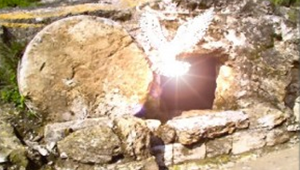Does Easter make a difference? Did the flurry and frenzy of Holy Week activity become an expression of the power that raises the dead? Or was it more like a Memorial Day weekend? Was it only that we recalled the  One who made the supreme sacrifice for which we will always be thankful, but which remains essentially in the past—either the distant past of the actual event or a more recent past when perhaps we witnessed something like resurrection power? Or did we celebrate something, or Someone, who demonstratively makes a difference today, this week, in our and the world’s story from now on?
One who made the supreme sacrifice for which we will always be thankful, but which remains essentially in the past—either the distant past of the actual event or a more recent past when perhaps we witnessed something like resurrection power? Or did we celebrate something, or Someone, who demonstratively makes a difference today, this week, in our and the world’s story from now on?
I have thought in recent years that just as Jesus rose from the grave in the first century, he must also rise from the pages of our Bibles. Of course, I do not suggest that Jesus is somehow mired in a past record of what happened. No, if the record can be trusted, Jesus is alive, present and at work in the world, not least in, among and through communities of his people. But I am suggesting that for many people, even among his followers, Jesus is stuck in the Bible—he rose from the dead which is an amazingly good end of a story and which offers hope that his good end can somehow be good for others as well. In that sense, Jesus must also rise from the pages of the Bible.
The remarkable fact of history is that he was never stuck or mired there in the first place. In fact, it is only because he was known to be alive, present and at work in the world that the story, these stories we call gospels, were ever written in the first place. Consider that by all reckoning, the earliest of these stories found written form three or more decades after Jesus’ cross and resurrection. Most of us can’t remember what happened three years ago with any detail, nor can most families or clans even when they piece together a “collective memory.” They can’t, that is, unless something unforgettable happened to them—either incredibly bad or good—something unexpected, indisputable, and unparalleled in their common or ordinary experience.
That is the claim made consistently from the third day onward. Jesus was not there, in the tomb that is, but Jesus was here and there, encountering broken and grieving women who came to finish caring for his corpse, walking incognito with friends bewildered and overwhelmed by their dashed hopes that Jesus was the One they’d expected, suddenly in the midst of his friends fearfully gathered behind locked doors, at the pre-arranged mountain rendezvous where Jesus confirmed his presence, conveyed his power, and commissioned his work through them.
That Jesus rose from the dead, alive, at work, throughout the world is precisely why any stories about him came to be written. If he was not known to be and experienced as ALIVE his story would have faded into relative oblivion, like the stories of many others who once were thought to be Messiah, but whose names hardly anyone knows today. That Jesus never was embedded (or entombed) in a book, that the book never served any other purpose than to witness beyond itself to the One whose story it tells—is the reason we have the book in the first place.
He is risen indeed, from the literal stone cold and hard tomb where he lay. He is not to be found in that place of the dead. Only the linen wrappings were found there. Similarly, the book that tells us the story of Jesus alive, present and at work in the world, does not hold him, confine him, or contain him, but points us to him, invites us to trust him and to follow him. The book that tells us the story, his story, shows where following him leads: to “dying” with him, to a renewal of mind and heart at the core of our being (by the same Spirit who raised him from the dead), and then to walking with him every day in the way he walked, above all in the way of love that he walked, a way that has and will change the world.